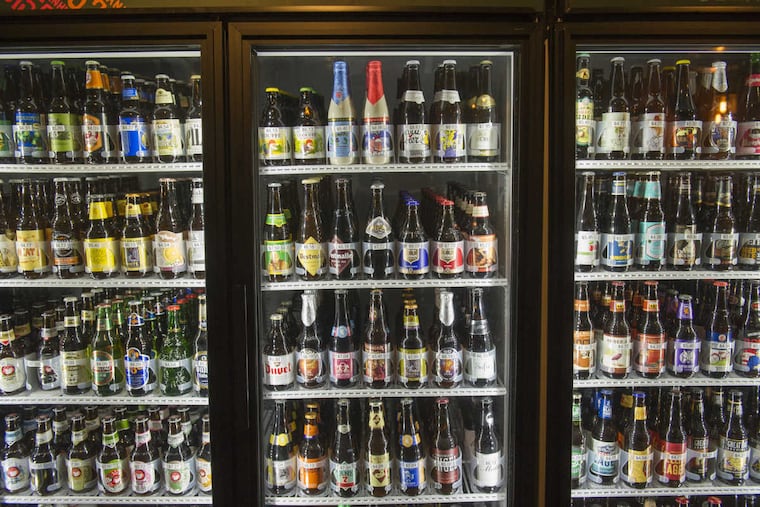Convenience store chains push to sell alcohol as industry newcomers disrupt the norm
Wawa is awaiting liquor license approval for a store in Ambler.

Perhaps you’d like a cold IPA with your hoagie?
That’s an option at two pioneering Wawa stores in Delaware County.
Convenience store chains — notably Wawa and Sheetz — are beginning to add alcohol sales to their stores as newcomers threaten to upend the boozy status quo.
In Pennsylvania, traditional convenience stores now must contend with such booze-friendly companies as goPuff, the Philadelphia-based food-delivery startup that has disrupted the idea of who sells alcohol and how customers can get it. And reflecting the shift in industry norms, Pennsylvania’s notoriously stringent alcohol sale laws, overseen by the Liquor Control Board, have eased somewhat.
“We’ve seen an increasing number of convenience stores applying for and receiving liquor licenses,” Shawn Kelly, a spokesperson for the PLCB, said Friday.
Wawa, created and headquartered in Delaware County, declines to say much about its involvement with liquor. But it won its first Pennsylvania license to sell beer in 2019. It now offers beer at the two Delaware County stores and has requests pending with Pennsylvania liquor officials to expand such sales to three more stores, including one in Philadelphia.
It already has been selling alcohol products at more than 100 company locations in other states.
Convenience stores in Pennsylvania may sell beer to-go provided they have the right license from the PLCB. Wine sales require an expanded permit and allow a customer to buy up to three liters of wine at a time. The liquor board is the wholesale distributor of alcohol to the commonwealth’s convenience stores.
The chain that has most doggedly pushed to expand its footprint in Pennsylvania alcohol sales is Sheetz, based in Altoona. It has bid often in PLCB auctions that sell restaurants’ expired liquor licenses, which can be reactivated once transferred to a new owner.
At times, the chain has splurged by picking up multiple license at one shot. In 2017, for instance, it was the highest bidder for 17 Pennsylvania licenses during one auction. A few month later, it picked up 11 more. Since then, its purchases have slowed considerably.
The chain, not an active presence in the Philadelphia region, now has stores in five other states besides Pennsylvania. It has more than 600 stores across the nation, and sells beer at 223 out of its 279 locations in the commonwealth.
The legacy chains’ drive to sell alcohol pales compared to start-ups such as the relatively new goPuff, founded in 2013 by two Drexel University graduates, Yakir Gola and Rafael Ilishayev.
» READ MORE: Philadelphia start-up GoPuff, founded by Drexel grads, raises $1 billion
GoPuff, which delivers beer and everyday essentials — and convenience store food — directly to customers, now operates in 500 cities, including Philadelphia, according to its website.
Last year, goPuff, which delivers beer in the Philadelphia area but not wine, received a massive infusion of $750 million from SoftBank Vision Fund, a subsidiary of the Tokyo-based SoftBank Group, which is partly funded by the Saudi Arabian government.
SoftBank Vision Fund has promised that goPuff could receive an additional $250 million.
The growth of once unconventional alcohol sales has forced brick-and-mortar convenience stores to modernize in part by adding frothy options.
Currently, Wawa awaits a response from the LCB for a liquor license it recently applied for its store at 1139 Horsham Rd. in Ambler. Liquor licenses are also pending for a store at 9101 Frankford Ave. in Philadelphia and 296 Route 940 in Tobyhanna Township, a small community in the Poconos.
The liquor board issued its first Wawa license to the store at 721 Naamans Creek Rd. in Chadds Ford on April 24, 2019. The following December, the board issued another license to the company’s store at 1073 Baltimore Pike in Middletown Township, Delaware County.
John Stanton, a professor of food marketing at St. Joseph’s University, said Wawa was a leader in business innovation.
“Wawa’s in a position that if they fail, they can pull out and get another [new product] right behind it,” he said.
In recent years, Wawa has often been the top bidder — though not the most frequent bidder — in LCB auctions for expired liquor licenses.
Licenses don’t come cheap. PLCB records show Wawa spent as much as $186,000 for one license and almost that much for another.
Stanton, who has taught marketing at St. Joseph’s for 33 years after a 25-year period of consulting work for Wawa, said the chain is merely pushing Pennsylvania to join a practice that is routine elsewhere.
“People come to Pennsylvania and can’t even believe they can’t buy alcohol in convenience stores,” he said. Traditional convenience stores — Wawa is by far the most visible in Pennsylvania — “is just taking a step in the direction everyone is moving.”